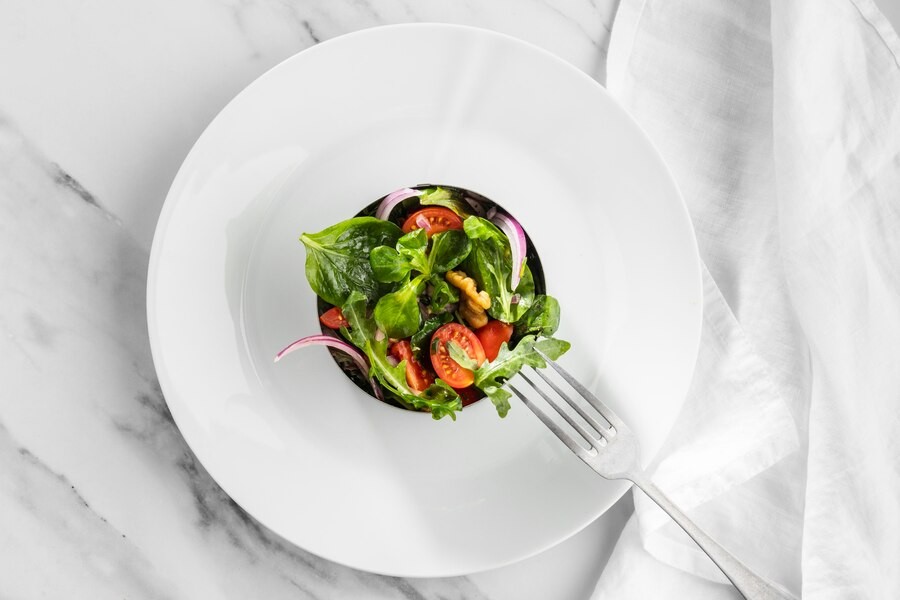Many people believe that eating smaller portions is a healthier option. This method is often pursued by those looking to lose weight and maintain their health.
Reducing portion sizes is thought to aid digestion and help the body utilize nutrients more effectively. But is it really true that smaller portions are healthier? Come out in the following article!
Benefits of eating small portions
Research indicates that consuming small, regular portions can offer various health benefits. Here are some key advantages:
Helps control weight
Eating smaller portions regularly can help keep calorie intake within reasonable limits. With less food on your plate, you are less likely to consume excess calories, which reduces the risk of weight gain.
Moreover, eating smaller meals more frequently can prevent extreme hunger, a common trigger for overeating.
Maintains stable blood sugar levels
Another benefit of eating smaller portions is that it helps keep blood sugar levels stable. Large meals, especially those high in simple carbohydrates, can cause rapid spikes in blood sugar.
These spikes are often followed by sharp declines, leading to quicker feelings of hunger and unstable energy levels.
In contrast, by eating smaller, more frequent meals, you can avoid these fluctuations and maintain steady energy throughout the day.
Improves digestive health
Eating small, regular portions can also assist your digestive system by preventing overload. A smoother digestion process can reduce common issues such as constipation, bloating, and stomach discomfort.
How to eat in small portions
Adopting a habit of eating small portions can effectively help with weight control and overall health. Here are some tips to get started:
Use smaller plates
Studies show that using larger plates often leads to overeating. In contrast, using smaller plates can help you automatically reduce portion sizes without feeling deprived.
Try switching your regular plates for smaller ones to better control your food intake.
Spread out your meals
If you usually eat three large meals a day, consider breaking those into five or six smaller meals. For instance, you could divide a large lunch into two smaller portions eaten at intervals.
Focus on nutrient-dense foods
Choosing nutrient-dense foods is just as important as controlling portion sizes. Prioritize foods that are rich in nutrients but low in calories, such as fruits, vegetables, lean proteins, and whole grains. This way, even with smaller portions, you can still meet your nutritional needs.
Listen to your body's signals
Learn to pay attention to your body. Eat when you are hungry and stop before you feel completely full. This practice can help you control portion sizes and prevent overeating.
Choose healthier snacks
While snacks like chips, candy, and pastries are tempting, they often contain high levels of calories that can contribute to weight gain. Instead, opt for healthier snacks such as fruits, nuts, or low-fat yogurt, which are more nutritious.
A healthy eating pattern should prioritize balanced nutrition tailored to your body’s needs. If you are unsure about what foods to choose, consider consulting with a doctor or nutritionist. You can also make use of the consultation features that are available in the Ai Care application by downloading the Ai Care application from the App Store or Play Store.
Looking for more information about nutrition, food and other diet tips? Click here!
- dr Nadia Opmalina
Lindsey DeSoto, RDN, LD (2022). Is it better to eat several small meals or fewer larger ones?. Available from: https://www.medicalnewstoday.com/articles/is-it-better-to-eat-several-small-meals-or-fewer-larger-ones
Rayven Nairn, MS, RDN, LDN (2022). Timing is Everything: Why Eating on A Regular Schedule Supports Overall Well-Being. Available from: https://wellbeing.jhu.edu/blog/2022/12/09/timing-is-everything-why-eating-on-a-regular-schedule-supports-overall-well-being/
Antonio Paoli, et all (2019). The Influence of Meal Frequency and Timing on Health in Humans: The Role of Fasting. Available from: https://pubmed.ncbi.nlm.nih.gov/30925707/
Lainey Younkin, MS, RD, LDN (2024). What Happens to Your Body When You Eat Too Much. Available from: https://www.eatingwell.com/article/7900720/what-happens-to-your-body-when-you-eat-too-much/
James Roland (2024). How Does Eating Affect Your Blood Sugar?. Available from: https://www.healthline.com/health/and-after-effect-eating-blood-sugar#carbohydrates
Diana Kelly Levey (2024). 15 Tips To Use Portion Control for Weight Loss. Available from: https://www.health.com/weight-loss/14-ways-to-cut-portions-without-feeling-hungry
British Heart Foundation. 8 top tips for portion control. Available from: https://www.bhf.org.uk/informationsupport/heart-matters-magazine/nutrition/weight/perfect-portions/top-tips-for-portion-control












